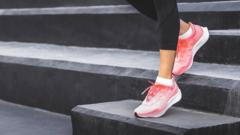Are You Overdoing It on Sleep, Exercise, and Hydration?

A Critical Look at Common Health Benchmarks: Are They Set in Stone?
In recent days, a study has emerged that challenges the long-held belief that achieving 10,000 steps a day is essential for optimal health. Instead, it suggests that merely reaching 7,000 steps can be sufficient for many individuals. This revelation prompted a wave of relief among health-conscious individuals, who often feel pressured to meet stringent health targets. But this raises an important question: how rigid are the other health benchmarks we often adhere to? Are there allowances, or is strict adherence necessary for a long and healthy life? This article delves into various commonly cited health targets—such as hydration, sleep, exercise, and mindfulness—to investigate their validity and explore whether there's room for flexibility.
The Fluidity of Hydration Guidelines
The National Health Service (NHS) recommends that adults drink between six to eight glasses of water daily, equating to approximately 1.5 to 2 liters. This guideline has been ingrained in our collective consciousness, but how essential is it really? Professor Neil Turner, a kidney specialist at the University of Edinburgh, presents a compelling argument: humans have thrived for thousands of years without precise measurements of water intake.
"Mice don’t need flashing water bottles telling them how much to drink—why do we?" he questions, emphasizing that our bodies are naturally equipped to regulate their hydration levels. According to him, as long as our urine is light in color and we feel thirsty, there’s no need to stress over hitting a specific number of liters each day.
However, Dr. Linia Patel, a performance nutritionist, offers a different perspective. She believes that while individual hydration needs can vary based on factors like body size and activity level, having a target of 1.5 to 2 liters is beneficial, particularly for women. Symptoms of dehydration, such as fatigue and brain fog, can be easily alleviated by maintaining consistent hydration.
The Sleep Paradigm: Are We Overdoing It?
When it comes to sleep, the NHS suggests that adults should aim for seven to nine hours each night. Professor Ama Johal, a sleep disorders expert, underscores the critical nature of sleep for overall health. He asserts that inadequate sleep increases the risk of numerous health issues, including obesity and diabetes, and may even shorten lifespan.
Interestingly, when asked if it’s possible to get by on just six hours of sleep, Prof. Johal firmly responded "no." Lowering the sleep requirement could mislead individuals into thinking less sleep is acceptable, leading to potential health ramifications. Unfortunately, while cat naps can offer some benefit, they cannot replace the necessity of a full night's rest. However, he acknowledges that targeting several nights of quality sleep per week can still be advantageous.
How Much Exercise Is Enough?
The Chief Medical Officer recommends at least 150 minutes of moderate exercise weekly, along with two strength-training sessions. But is this guideline realistic for everyone? Dr. Sinead Roberts, a sports nutritionist experienced in training elite athletes, argues that while exercise is crucial, we need to adapt these recommendations to fit our individual lifestyles.
She likens health benchmarks to a highway: the more you engage in healthy practices, the wider the road becomes, allowing for occasional detours without veering off course. This perspective resonates with many, including Emily and Lucy, who participate in a walking group. While they strive to meet some health benchmarks, they also recognize that life can get in the way, and they focus on gradual improvements rather than perfection.
The Mindfulness Minute: Is Ten Minutes Enough?
In its Every Mind Matters campaign, the NHS promotes practicing mindfulness for at least ten minutes daily. This directive encourages individuals to focus on the present moment, enhancing mental clarity and emotional well-being. Psychologist Natasha Tiwari suggests that even brief moments of mindfulness can yield positive effects, making it less about the duration and more about the awareness.
However, many people often feel overwhelmed by these targets. Tiwari argues that the key is integrating mindfulness into daily routines rather than seeing it as an additional task that adds to stress. This perspective allows for a more flexible approach to mental health, emphasizing that even short breaks can have significant benefits.
Embracing Flexibility in Health Guidelines
As we navigate through these various health benchmarks, a common theme emerges: while guidelines provide a useful framework, it's essential to approach them with flexibility. Life is inherently unpredictable, and the idea of achieving perfection in every health domain can lead to undue stress.
Instead of fixating on strict numerical targets, consider adopting a holistic view of health. This perspective encourages individuals to incorporate healthy habits into their lives in a way that's sustainable, enjoyable, and adaptable to changing circumstances.
Frequently Asked Questions
Is drinking 8 glasses of water a day essential for everyone?
No, individual hydration needs vary. While the NHS recommends 6-8 glasses, it's crucial to listen to your body's signals and drink when you're thirsty.
How much sleep do I really need?
Most adults require between 7-9 hours of sleep per night for optimal health. Consistently getting less than this can have negative health effects.
What is the minimum amount of exercise I should do weekly?
The Chief Medical Officer recommends at least 150 minutes of moderate exercise per week, along with strength training. However, any amount of activity is better than none.
Can I benefit from mindfulness if I only practice for a few minutes daily?
Yes! Even brief moments of mindfulness can positively impact mental well-being, so it's more about the quality of practice than the quantity.
Ultimately, health is a personal journey. Rather than obsessing over specific benchmarks, aim for a balanced lifestyle that promotes well-being in various facets—physical, mental, and emotional. How do you approach your health goals? Have you found flexibility to be beneficial in your journey? #HealthAndWellness #MindfulLiving #FitnessJourney
Published: 2025-07-26 00:14:13 | Category: technology



